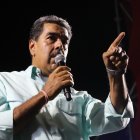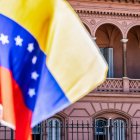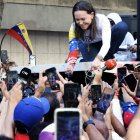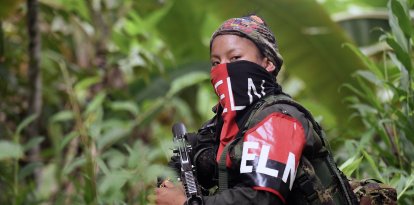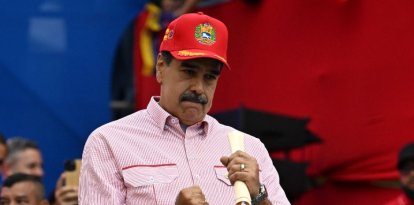Another international operation shakes the Maduro regime: the couple of the kidnapped Argentine gendarme managed to secretly leave Venezuela
The escape occurred in a context of high political tension, marked by a new wave of arbitrary arrests ordered by the Venezuelan dictatorship.

Nicolas Maduro
In a secret operation coordinated by the Argentine government and backed by human rights organizations, María Alexandra Gómez García and her two-year-old son, Víctor Benjamín, managed to leave Venezuela for Buenos Aires. Gómez García, a Venezuelan national, is the partner of Nahuel Gallo, the Argentine gendarme detained by Nicolás Maduro's regime since December 2023 without formal charges or access to a legal defense.
Mother and son undertook a risky journey by land from Anzoátegui state to the Colombian border. Although she was not prohibited from leaving the country, the fear of being detained with her son in a context of increasing repression led her to ask for accompaniment. From Bogota, they boarded a flight with a stopover in Panama, supervised by Security Minister Patricia Bullrich, with support from activists such as Elisa Trotta and diplomatic personnel.
Growing tension in Venezuela and fear of new arrests
The flight came at a time of maximum tension in Venezuela, following a wave of arbitrary arrests ordered by the regime. More than 70 people have been detained in recent weeks, which has generated international concern. Although Alexandra was able to leave the country without legal restrictions, political instability and her precarious economic situation were decisive in her seeking help and refuge in Argentina.
Nahuel Gallo, a member of an Argentine federal border control force, had crossed from Colombia into Venezuela to visit his family. He was arrested shortly after crossing the Francisco de Paula Santander International Bridge. Since then, he has been held incommunicado. His last communication with Gómez García was on December 8, when he managed to make a brief call from the cell phone of a driver who was taking him to an appointment with Venezuelan authorities. From that moment on, he disappeared.
Official silence and family claims.
The gendarme's mother, Griselda Heredia, reported that she had no knowledge of the evacuation operation of her son's partner or of Nahuel's current condition. "I am desperate, calling everyone. If she is free, what situation is my son in?" she expressed in statements to Argentine media. She assures that she has no contact with Gómez García and that she found out about the operation through the press.
So far, the only proof of life of the gendarme has been a video and some photographs in which he appears dressed as a prisoner, possibly taken in the El Rodeo prison, known for its extreme conditions.
"State Terrorism".
The statement described the situation as a case of "State terrorism" and announced that Argentina will intensify its complaints before the International Criminal Court for crimes against humanity committed by the Venezuelan regime.
Extractions in the midst of repression
The operation that allowed the departure of Gómez García and his son is added to other recent actions that reflect the deterioration of minimum guarantees in Venezuela. Just a few weeks ago, five Venezuelan opponents who had remained in asylum in the Argentine Embassy in Caracas since March 2024 managed to leave the country after more than a year locked up in the diplomatic headquarters.
The event was celebrated by the United States. Secretary of State Marco Rubio posted on his X account:
"The U.S. welcomes the successful rescue of all hostages held by the Maduro regime at the Argentinian Embassy in Caracas. Following a precise operation, all hostages are now safely on U.S. soil (...) We extend our gratitude to all personnel involved in this operation and to our partners who assisted in securing the safe liberation of these Venezuelan heroes."
These operations, carried out with a high level of coordination and discretion, have been possible thanks to the cooperation between democratic governments and human rights organizations, in the face of a judicial system widely criticized for its use as a tool of political persecution.





